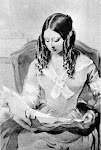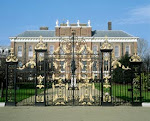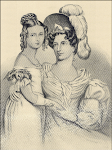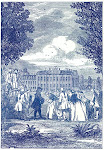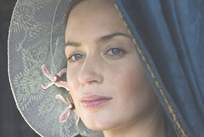Here is a real, true peek into what Queen Victoria's life was like--just before she became Queen. It truly is. Let me know what you think!
The man sat comfortably in the carriage as he held the while envelope. Soon he would be there and it would be time. He would not put up with anything getting in the way of what he had to do. He fully intended to complete his errand and if anyone tried to prevent him from doing so…there would certainly be trouble.
Holding the envelope with the seal, he watched the passing landscape as he thought about what loomed ahead. He hoped for everyone’s sake it would go smoothly. He noted that they were close to the residence now and he sighed. He would feel relieved when all this was done with.
After awhile, he could hear the crunching of little stones as the carriage slowed up near the entrance. Soon he would be at the door and he would not waver. Waiting until the carriage was at a full stop, he let himself out. The dust flew up and he dusted off his pants quickly as he approached the door.
He knocked and it was opened by a butler who admitted him into the royal residence. Being the Lord Chamberlain, there was no need to introduce himself. “I have a letter for Her Royal Highness, Princess Victoria,” he said.
“Come in, sir.”
He waited by the door, in no rush. Several moments later Sir John Conroy walked into the large foyer. “Lord Conyngham...what a pleasure to see you again. Might you follow me into the study?”
The Lord Chamberlain’s voice was loud and firm. “That won’t be necessary, Sir Conroy. I am here on official business on behalf of His Majesty with the intention of seeing the Her Royal Highness, Princess Victoria.”
Conroy looked momentarily troubled. “Quite impossible, My Lord. She is in the middle of a lesson.”
“Disturb her then,” the Lord Chamberlain said sternly.
Conroy took a step towards the man. “That’s quite impossible as I said, My Lord. The Duchess has left strict instructions that she not be disturbed.”
“Then fetch the Duchess.”
“Ah…”
“Or can she not be disturbed either, Conroy?”
“No, My Lord. I will get her at once.”
Lord Conyngham watched Conroy leave and he was a little amused. Conroy was certainly flustered. The King had never demanded anything like this before…insisting that a letter be placed in Her Royal Highnesses hands alone and nowhere else. He was not sure what the letter contained but he knew it was urgent. His thoughts were interrupted by the sounds of footsteps approaching the foyer area.
The Duchess of Kent appeared through an enormous door, swathed in pale yellow, with her hair pulled back severely. Her face was radiant and smooth and she appeared solemn. She gave the Lord Chamberlain a quick smile.
“Good afternoon, My Lord. Now what is all this about? Sir Conroy says that you have an urgent need to see my daughter?”
“Yes, Your Royal Highness,” he began, bowing slightly, as Conroy stood behind the Duchess. “His Majesty, the King has sent me here with something for the Princess only. It is a letter that I hold in my hand. I must give it to the Princess herself and no one else.”
The Duchess looked down at his hand, and she clutched one side of her light yellow gown as if she was nervous. “Well, certainly, His Majesty could not have meant that I, her own mother, could not be trusted to hand it to her.”
Irritated, Lord Conyngham took the letter and held it up for the Duchess to see. “As you can see this has been sealed by the King and it indicates clearly that I am to show this to whom ever is in attendance, however, I must place it in the Princess’s hands myself. And I do intend to do that, Your Royal Highness. Do you wish me to wait until the Princess has finished her lesson?”
“Very well, then. She may receive it in my presence in the drawing room. Mr. Conroy, would you send word that the Princess should be interrupted and that she is required in the drawing room right now? And My Lord, please follow me into the drawing room and make yourself comfortable.” The Duchess turned daintily and walked slowly into the drawing room of light blue and gold, and took a seat close to the entrance doors. She wrung her hands. “Please do sit down, My Lord.”
“No thank you, Ma’am. I’ve been sitting in the carriage and my legs are quite cramped.”
“Indeed. Yes, I understand.”
It seemed a very long time, yet it was probably only minutes until Victoria entered the room. The Lord Chamberlain bowed. “Your Royal Highness.”
“Lord Conyngham…what a delight to see you again.”
“You’re very kind, ma’am. I’m here because His Majesty the King has sent me here, with the express purpose of handing you this letter personally.”
“Thank you very much,” the Princess said as she took the paper from him. Looking around, she absently opened it to see what it contained. Once she had read it thoroughly, The Lord Chamberlain made a polite goodbye.
“Thank you, My Lord,” the Princess said as he left the room.
Victoria re-read the letter again slowly and then looked at her mother. Knowing she had no choice but to allow her mother to read it too, she walked over to the Duchess and handed it to her.
The Duchess grabbed it and Victoria took a step back, almost in fear.
Conroy was standing quietly in the drawing room entrance.
“Well, well, well….” The Duchess said as she flattened the paper to her liking. “Isn’t this the most highly indignant thing that has ever taken place? He would try to be sneaky about it.” She looked over at Conroy.
“Quite sneaky of him, but typical,” Conroy agreed. .
The Duchess of Kent scanned the letter. “This is appalling! Sir Conroy, come look at this, at once!”
“Mamma,” Victoria pleaded. “It is my letter.”
“Your letter? No, dearest. What involves you involves me. You are much too young to fully understand such matters.”
“I fully understand,” Victoria said in a sharp tone, “that the King feels that I am entitled to my own allowance from the Privy Purse, to do with as I will, and that also means setting up my own household, which is the right and proper thing to do.”
“Oh really, my dear? And who is filling your head with such nonsense? It is not fitting for you to live alone or be alone. You are much too young and you are not married and it is beyond comprehension that anyone should try to separate us. I won’t have it!”
“You may not have a choice, Mamma.”
The Duchess glared at her daughter with narrowed eyes. “You would throw me aside, wouldn’t you? After everything I have done for you, after all the pain I have endured…you would push me aside as if I were nothing!”
Conroy stepped into the room, closer to the Duchess. “That would be most unkind and unforgivable…to throw your mother aside after she has devoted her whole life to your care. If word of it got out, you would appear very cruel, indeed.”
Furious, Victoria walked towards the door. The Duchess grabbed her arm as she passed. “You aren’t leaving me until I let you go. You are becoming most rude.”
“Me?” Victoria snapped. “You are the one insinuating I would throw you aside! You are the one whose mind is filled with nasty thoughts.”
Conroy shut the drawing room door and blocked the exit.
Victoria looked at him with hatred. “Are you trying to keep me prisoner, Mr. Conroy?”
“Victoria!” The Duchess screamed. “Sit down this instant! This instant!”
Victoria lowered herself into a chair at the sound of her mother’s bellowing voice. She couldn’t fight the two of them. Her knuckles were white as she clutched the side of the chair and her heart was pounding in her chest. .
“No one is leaving here until this matter has been settled, to everyone’s satisfaction,” the Duchess of Kent said shrilly. “As the mother to the future Queen, I will not be pushed aside like this after a lifetime of devotion and care, and allow you to leave here and set up your own household. No! It is not fitting or right, and the King is quite improper for even thinking such a thing!”
Conroy stayed near the door and the Duchess sat across from her daughter. She took deep breaths to try to calm herself. Victoria watched quietly, trying to feel nothing. It was just another day in the prison as far as she was concerned, and things could stay like this….well, for a long time. But, she would be eighteen soon, and that would count for something. She didn’t want to push her mother aside. She had no real wish to hurt her. But, as heir to the throne, she had every right to consider setting up her own household…a household more to her own liking. She couldn’t live like this any longer. Ten thousand pounds per year was quite generous, and indeed, she could probably live very well. She looked at the pale blue walls, and it occurred to her that the blue color was as light as the sky. It really was beautiful. She had never noticed before how soothing, yet crisp it was. Staring at it, her eyes began to water. She looked away. She wondered where her dog Dash was.
“What we shall do is this,” Victoria’s mother began. “You will write to the King that while you are thankful for his kind offer, you cannot accept it exactly as stated… concerning the matter of money, these funds are to be given to your Mother, whom you trust implicitly to do what is necessary.”
The Princess did not look at her mother.
“We shall allow Victoria control of four thousand pounds and I shall be in control of six thousand. I think that would be fair and would allow us both a certain amount of the amenities that should have been ours years ago and befitting of our stature and precedence. Mr. Conroy, do you think that is fair?”
Conroy nodded. “As usual, you are fair. You always do the right thing, in my opinion, for the family’s benefit and not for one person in particular.”
Victoria knew that the four thousand pounds she would receive would benefit her but, it would not be enough to run her very own household in a manner in which an heir to the Throne would be expected. Again, she would be forced to stay with her mother. One part of her heart was relieved that her mother would have additional funds—Mamma always seemed to be borrowing—but another part of her was enraged. As usual she had no say in any matter.
“And while we are at it, are you ready to sign the papers making Conroy your personal secretary, upon your accession to the Throne?”
“I will not,” Victoria hissed.
“Then you shall see no one. No more friends, no visitors, no one…..except your instructors. You may retire to you room now.”


